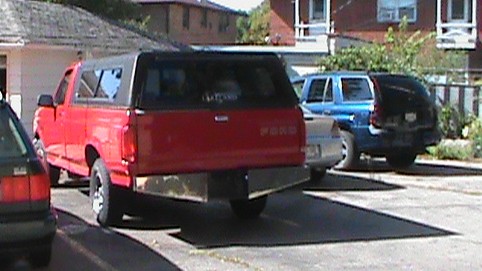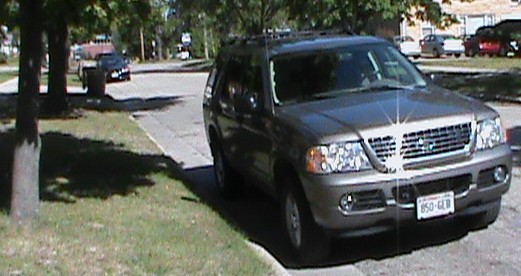This breaks down into two separate questions. The first is do you have to be driving? The second is can you be charged if you are on private property in a parking lot?
Parked along a street or highway
Section 346.63 of the Wisconsin Statutes prohibits operating a motor vehicle while under the influence of an intoxicant on a highway. Our jury instructions tells a jury that “operate means the physical manipulation of any of the controls of a motor vehicle to put it in motion.”
So, if the key is in the ignition, especially if it is turned on, someone is operating it.
Also, the police do not have to see you driving to prove that you drove or operated. They will ask you and if you tell them you drove, you just provided proof. If they say you told them you drove, even if you did not tell them this, they have evidence which, if believed, proves that you drove. (See talking to the police.) If they have evidence that your car was recently moved, they have evidence. They do not have to see it to prove it.
“Operating” may be proved by circumstantial evidence — the presence of the vehicle at the gas station, the person’s presence behind the wheel, his responses during questioning, the unlikelihood of the passenger’s ability to operate due to his incoherent condition and the absence of any evidence the passenger was the driver. State v. Merles.
2008 WI App 179,117, 315 Wis.2d 756, 762 N.W.2d 813.
However, mere presence is not operation. They do have to prove that you were the one operating! In Village of Cross Plains v. Haanstad. 2006 WI 16, Tf23,288 Wis.2d 579, 709 N.W.2d 447, the court concluded that the defendant did not “operate” a vehicle where”… Haanstad was merely sitting in the driver’s seat of a parked vehicle. Although the engine was running, the uncontested evidence shows that Haanstad was not the person who left the engine running. She never physically manipulated or activated the controls necessary to put the vehicle in motion.” (She had evidence that someone else had started the car, she was just sitting there.)
But is along the side of the road or off the road “on a highway?”
“Highway” is defined by sec. 340.01(22): “‘Highway’ means all public ways and thoroughfares and bridges on the same. It includes the entire width between the boundary lines of every way open to the use of the public as a matter of right for the purposes of vehicular travel. It includes those roads or driveways in the state, county or municipal parks and in state forests which have been opened to the use of the public for the purpose of vehicular travel and roads or driveways upon the grounds of public schools, as defined in s.115.01(1), and institutions under the jurisdiction of the county board of supervisors, but does not include private roads or driveways as defined in sub. (46).”
I was on a private road. So am I OK?
Section 346.0 l(lm) added “In this chapter, in addition to the meaning given in s. 340.01(22), ‘highway’ includes a private road or driveway that is subject to an agreement for traffic regulation enforcement under s. 349.03(5).”
Well, I was in a parking lot! Surely that isn’t illegal.
“Most provisions of this chapter are applicable only upon highways. This section gives the sections relating to reckless and drunken driving somewhat broader applicability. They will apply in such areas as parking lots, filling stations and loading platforms.” 1957 Legislative Council Note
In Citv of LaCrosse v. Richling. 178 Wis.2d 856, 505 N.W.2d 448 (Ct. App. 1993), the court held that the parking lot of a bar and restaurant was “held out to the public” because potential customers are part of “the public.” “We believe the appropriate test is whether, on any given day, potentially any resident of the community with a driver’s license and access to a motor vehicle could use the parking lot in an authorized manner.” 178 Wis.2d 856, 860. The Richling test was applied in State v. Carter. 229 Wis.2d 200,598 N.W.2d 619 (Ct. App. 1999), to hold that a parking lot of a closed gas station was also “held out to the public.” [WI Crim Jury Instruction 2600]
How about the private parking lot of my own apartment or a friend’s apartment?
Bad news there, as well. Wisconsin, for purposes of enforcing the drunk driving and reckless driving laws has defined a highway to include a private parking lot of any apartment building with four or more apartments.
So, you cannot sit in your car in your own parking spot, and listen to the radio while you are under the influence. For that matter, you probably will get in trouble if you are under the car changing the oil, if the key is in the ignition and the radio playing!
Conclusion – You can get a DUI for being parked in your own parking place, or in someone else’s parking lot, even a private lot, much less for being parked on the street.
And… you will be convicted unless you have a good lawyer. That you were in a parked car with no driving after you had been drinking, or even while completely intoxicated does not mean that you violated this law. It certainly doesn’t mean that the government can prove that they violated this law.
However, I like to drink Ginger Beer. It is a non-alcoholic beverage that comes in brown bottles. It is legal for me to drink it while I am driving. That it is legal does not mean it is a good idea, unless you like having long conversations with young police officers, and enjoy doing stupid people tricks by the side of the road. Drinking that Ginger Beer while driving will give the police an excuse to cause me problems. I don’t care to do that.
Warning – Use at your own risk.
The laws in every state are different, and the laws in Wisconsin are constantly changing. While the information on this page is current as of September, 2012 in Wisconsin, it may not be accurate at a later date or in a different state.
This page is not intended to be legal advice or substitute for legal advice. It is intended to provide general information. Legal advice can only be given with a full understanding of the actual facts of a case, generally in a face-to-face consultation. Note that there are exceptions to many of the statements made here. No one should act or refrain from acting in court based on anything stated in this web page. My office does not give legal advice to non-clients over the phone or on the internet.
Further, the law and procedures in drunk driving cases are changing rapidly. This page reflects law in place in Wisconsin, on July 31, 2012.

